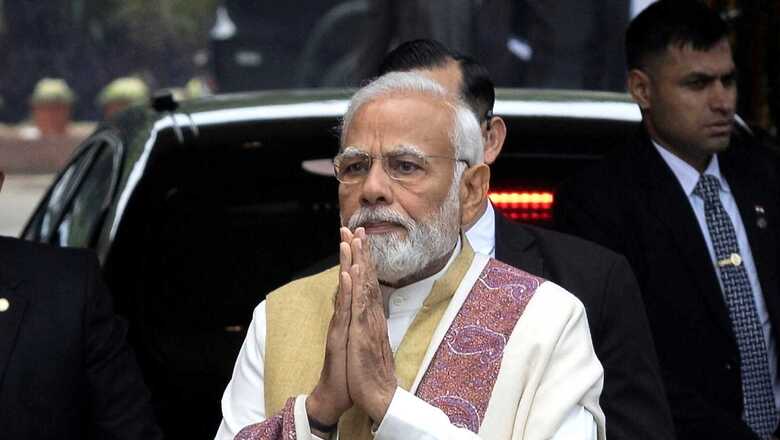
views
It has been over a month since the first episode of the two-part BBC documentary ‘India: The Modi Question’ was aired by the BBC’s UK service. Yet it continues to make headlines as a major new flashpoint in our polarised political debate.
The latest assertion by External Affairs Minister S Jaishankar that the documentary (broadcast on January 17 and 24) is ‘politics by another means’, that its airing now was not “accidental” and that the political season has “begun in London and New York” is yet another indicator of how much of a political lightening rod the documentary has become.
As we head into the next national election in 2024, over the last month, we have seen a tax ‘survey’ of the BBC’s Delhi and Mumbai offices, a detailed statement from the Income Tax department on its findings and another political row over comments by the billionaire George Soros on his hopes of a ‘democratic revival” in India. This unleashed a strong counter-reaction from the BJP as well. First, Union minister Smriti Irani accused Soros of wanting to “weaken” India in order to pick a “pliable” government. Then, Jaishankar, speaking in Sydney, called the tycoon ‘old, rich and dangerous”.
Broadly speaking, at the core of the BJP’s discourse over the BBC and Soros controversies is the idea that a powerful coalition of foreign entities – civil society, global media, liberal elites – are looking to malign a popular democratically elected leader, Narendra Modi, and stymie the rise of an assertive new India.
The BBC documentary itself has been blocked in India and has seen protests in several campuses. While British Prime Minister Rishi Sunak has asserted that he does not agree with the documentary’s characterisation of PM Modi, the British government has said it “stands up for the BBC” and its editorial freedoms in the UK Parliament. The BBC itself tweeted after the tax ‘survey’ that its journalists will continue to “report without fear or favour.”
The big question is how this debate is playing out domestically and what its implications in election season are.
First, the idea of an interfering ‘foreign hand’ has old antecedents in Indian politics — going back to the Indira era. The big difference this time is that while it was deployed earlier in the context of shadowy state elements in foreign governments wanting regime change, the subtext on the ground now is different.
The Modi government’s aggressive counter-response is unfolding at a time when New Delhi has renewed currency as a major global player. Just last week, for example, US President Biden and French President Emmanuel Macron together announced the Boeing and Airbus deals. India is hosting the G20 this year and Delhi will be hosting G20 foreign ministers in March.
In many ways, the sub-text is clear: the foreign hand in the discourse now is not foreign governments but global elites, civil society and media entities who, in this telling, never made peace with Modi’s electoral triumphs. And, in this view, are now out to reverse it.
Second, it is important to distinguish between how this debate is playing out globally and its domestic power play. The bogeyman here is the trope — encapsulated by the BBC documentary and the Soros comments — that essentially posit the idea of India as under siege from Hindu nationalism. This view is widely shared by many global elites — the sorts who run global publications and civil society organisations — and many of the old elites in India.
At the mass politics level, no one seriously believes that the BBC or Soros can effect electoral outcomes. Yet, the fact that this narrative is widely espoused and shared by many of the BJP’s secular opponents in India makes it a powerful political bogey. This is one reason why the Congress was careful to officially distance itself from the Soros comments, though some of its leaders did echo his sentiments.
At the heart of the BJP’s counter-narrative is the idea of Narendra Modi as the popular democratically elected son-of-the soil leader, whose political ascent pushed the old entitled elites to the margins. In this narrative, Modi’s ascent is symbiotically linked with the rise of a new, more assertive India, which is being resisted by the old elites. They, in turn, are helped by sympathetic outsiders, who understand little of the country but use the war cry of ‘democracy in danger’ conveniently.
Or as Jaishankar put it — when democracy does not yield outcomes you like, you say democracy is in danger. This belief is at the fulcrum of the BJP’s pushback. And the aggressive statements by the MEA are part of the new imaginary of an assertive India.
Third, in realpolitik terms, the more this debate polarises India, the more it is likely to help the BJP. This is a political game of narratives that has long played to Modi’s advantage. In the BBC documentary case, for example, there was nothing new in the documentary, beyond an old British high commission report. In legal terms, the case itself was settled by the Supreme Court years ago — and after protracted legal processes that unfolded across two UPA terms in power.
Politically, this is not a new debate in India. We have seen it play out before. In fact, Modi’s rise as a national leader was built on an earlier version of precisely this debate. When the opposition painted Modi as the villain during his years as Gujarat chief minister, he responded with a powerful narrative of Gujarati asmita — or self-pride. In this telling, outsiders, out of touch with reality, were out to besmirch local pride.
Hinduness, the politics of identity and an injured regional pride as well as imagery of a strong leader suffused together in this political cocktail that powered BJP victories in the state in the early-2000s. This in many ways, was central to the early making of Brand Modi itself.
We are now seeing a national replay of the same old debate — the idea of an assertive, rising India, a wronged hero at the helm, of outsiders trying to malign the India story. The BJP’s assertive reaction is informed by this prehistory. It is the political framing that is key here on the road to 2024.
In many ways, this plays to Modi’s strengths. Part of Prime Minister Modi’s political teflon comes from his larger positioning as the political outsider, engaged in a perpetual class war against the old elites in defence of the downtrodden. Combine nationalism with it, and the idea of a rising India being blocked by old Western cultural gatekeepers, and it’s a powerful cocktail of political messaging.
Read all the Latest Opinions here




















Comments
0 comment